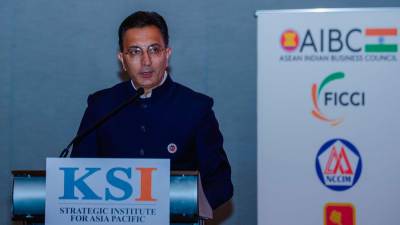KUALA LUMPUR: Malaysia plays a pivotal role in advancing the ASEAN-India economic track and will be central in shaping a resilient, connected and sustainable partnership for the next decade.
India’s Union Minister of State for Commerce, Industry, Electronics and Information Technology Jitin Prasada said Malaysia’s position as country coordinator for the ASEAN-India economic agenda underscores the depth of bilateral collaboration.
He highlighted the recent launch of the Malaysia-India Digital Council as a key initiative fostering cooperation in cutting-edge areas such as artificial intelligence, digital public infrastructure, and start-up ecosystems.
“The India-Malaysia Comprehensive Strategic Partnership opens new vistas for cooperation,” the minister said in his keynote address at the Joint Luncheon Ceremony of the ASEAN-India Business Summit 2025.
He noted that both nations are working closely in semiconductors, renewable energy and payment systems interoperability while also building on traditional sectors.
Jitin stated that ASEAN remains central to India’s Indo-Pacific vision, with Malaysia anchoring many initiatives to expand trade, investment and digital connectivity.
He proposed that ASEAN and India collaborate in building trusted supply chains for electronics, pharmaceuticals, agri-products, and healthcare.
The minister pointed out that over seven million people of Indian origin living in ASEAN member states act as vital economic and cultural bridges.
“We need to further rebuild these connections to enhance skills mobility, talent exchange, and innovation partnership,” he added.
ASEAN is currently India’s fourth-largest trading partner, while India ranks as ASEAN’s seventh, with bilateral trade reaching $131 billion in 2023.
Jitin emphasised that the ongoing review of the ASEAN-India Free Trade in Goods Agreement is a critical opportunity to address challenges like tariffs and non-tariff barriers.
On digital connectivity, he said India’s world-class public infrastructure, such as the Unified Payments Interface, could offer ASEAN partners scalable and secure platforms.
He revealed that India’s UPI is already linked with Singapore’s PayNow, with an aim to expand this interoperability across ASEAN, including with Malaysia.
The minister urged all parties to deliver a balanced, transparent, and future-ready framework through the agreement review.
“True resilience lies not only in numbers, but also in ensuring the supply chain can be diversified,” Jitin concluded.
He stated that while governments create enabling frameworks, business vision and innovation will make the ASEAN-India economic partnership the defining story of the Indo-Pacific. – Bernama
